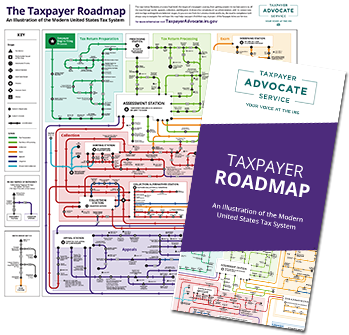Currently Not Collectible
View our interactive tax map to see where you are in the tax process. It could help you navigate your way through the IRS.
View our interactive tax map to see where you are in the tax process. It could help you navigate your way through the IRS.

You have a balance due on your tax account, which you agree that you owe the IRS, but you cannot pay the balance owing due to your current financial situation. If the IRS agrees that you cannot pay both your taxes and your reasonable living expenses, the IRS may place your tax account in currently not collectible (CNC) status.
This notice or letter may include additional topics that have not yet been covered here. Please check back frequently for updates.
The IRS may have determined that you cannot pay any of your tax debt, as a result, the IRS has reported your tax account currently not collectible (CNC) and temporarily suspended certain collection actions until your financial condition improves. CNC status does not resolve your tax debt and any applicable interest or penalties will continue to accrue; it means the IRS has determined you cannot afford to pay the debt at this time. Where am I in the tax system? Note: This is to pinpoint the user on the map, based on the qualifying questions.
You have a balance due on your tax account, which you agree that you owe the IRS, but you cannot pay the balance owing due to your current financial situation. The IRS understands there may be times when you can’t pay a tax debt due to your current financial situation. If the IRS agrees that you can’t pay your taxes and pay your reasonable living expenses, it may place your account in a status called currently not collectible.
The first thing to do is to check the return address to be sure it’s from the Internal Revenue Service and not another agency.
If it’s from the IRS, the notice will inform you that the IRS has placed your tax account in a status called currently not collectible (CNC). If you want more details about your tax account, you can order a transcript.
Don’t ignore the notices you get from the IRS about your balances due.
To see if you qualify for CNC status, you’ll need to contact the IRS. If you got a notice, use the contact information included there. If you don’t have your notice, call the following toll-free number for individual taxpayer assistance at ![]() 1-800-829-1040 (or TTY/TDD 800-829-4059).
1-800-829-1040 (or TTY/TDD 800-829-4059).
Contact the Taxpayer Advocate Service, if your problem is causing financial difficulty for you, your family, or your business; or you face (or your business is facing) an immediate threat of adverse action.
If your account is placed in CNC status and the IRS sends you a notice about your tax bill, call the number on the notice to discuss your financial situation. The IRS will take your updated information and decide if you still can’t pay your IRS debt and meet your living expenses. Make sure you have all the information about your income and expenses before you call.
You may prevent future tax liabilities by adjusting your withholding or making estimated tax payments
Understanding your notice or letter
For more specifics on your notice, visit Understanding your IRS Notice or Letter on IRS.gov.
Owe taxes? Understanding IRS Collection Efforts
Get Help topics
Browse common tax issues and situations at TAS Get Help
If you still need help
The Taxpayer Advocate Service is an independent organization within the IRS that helps taxpayers and protects taxpayers’ rights. We can offer you help if your tax problem is causing a financial difficulty, you’ve tried and been unable to resolve your issue with the IRS, or you believe an IRS system, process, or procedure just isn’t working as it should. If you qualify for our assistance, which is always free, we will do everything possible to help you.
Visit dev.taxpayeradvocate.irs.gov or call ![]() 1-877-777-4778.
1-877-777-4778.
Low Income Taxpayer Clinics (LITCs) are independent from the IRS and TAS. LITCs represent individuals whose income is below a certain level and who need to resolve tax problems with the IRS. LITCs can represent taxpayers in audits, appeals, and tax collection disputes before the IRS and in court. In addition, LITCs can provide information about taxpayer rights and responsibilities in different languages for individuals who speak English as a second language. Services are offered for free or a small fee. For more information or to find an LITC near you, see the LITC page on the TAS website or Publication 4134, Low Income Taxpayer Clinic List.
Related Notices and Letters
Currently Not Collectible